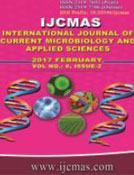


 National Academy of Agricultural Sciences (NAAS)
National Academy of Agricultural Sciences (NAAS)

|
PRINT ISSN : 2319-7692
Online ISSN : 2319-7706 Issues : 12 per year Publisher : Excellent Publishers Email : editorijcmas@gmail.com / submit@ijcmas.com Editor-in-chief: Dr.M.Prakash Index Copernicus ICV 2018: 95.39 NAAS RATING 2020: 5.38 |
White spot syndrome virus (WSSV) is considered as dangerous shrimp pathogen which causes severe economic loss to the shrimp production. Unavailability of protective and therapeutic measures is a serious constraint in aquaculture and till date, there is no effective preventive measure to treat WSSV. In this context, dsRNA was synthesised and used to prevent the replication of WSSV. RNA interference (RNAi) is a promising tool to fight against viral infections. Thus the application of RNAi technology was evaluated by examining the efficacy of virus-specific dsRNA (VP24, VP26, RR1 and wsv477) to inhibit WSSV replication in shrimp, Penaeus monodon. The efficacy of the synthesised virus-specific dsRNA for inhibition of WSSV replication was done by injection and oral delivery method. Shrimps injected with wsv477, RR1, VP26 and VP24 dsRNA provided survival rates of 90%, 80%, 60% and 50% respectively. Shrimps fed with WSV477, RR1, VP26 and VP24 dsRNA showed mortality rates of 80%, 70%, 50%, and 50% respectively. Among all the tested genes WSV477 showed higher potency against WSSV infection. Overall results of these studies clearly indicate the success of RNAi strategy which mainly depends on the functionality of the targeted gene.
 |
 |
 |
 |
 |